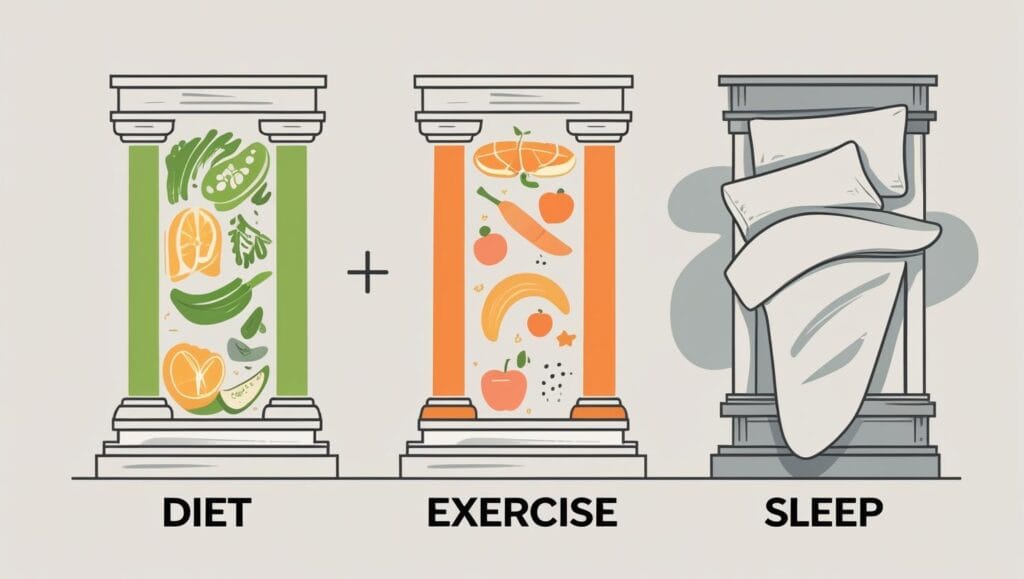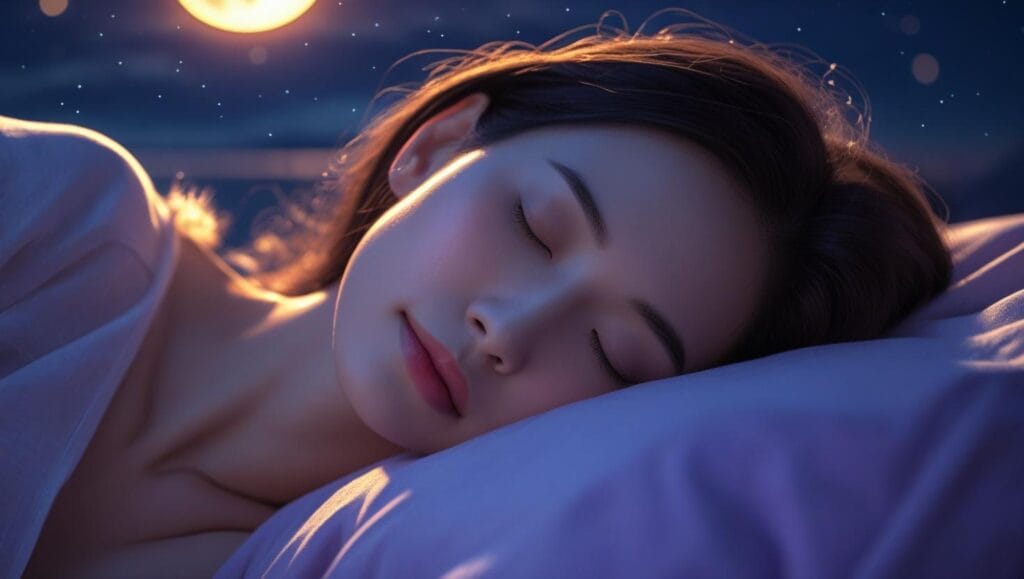(And Why It Matters Big Time)
You wake up tired, drag through the day, and wonder why your energy’s always on low, even after a whole night’s sleep.
You’re not alone. Honestly, in today’s hustle culture, sacrificing sleep has become almost a badge of honour. In a world obsessed with productivity, rest often gets sidelined. But here’s the truth: sleep isn’t a luxury—it’s your body’s most potent tool for healing, focus, and long-term health.
I used to think a whole night’s sleep was optional—something I could trade for productivity. It turns out I was swapping it for exhaustion, brain fog, and burnout. It wasn’t until I understood the science behind sleep that I realized just how much was at stake.
Whether you’re always tired, struggling to focus, or want to feel more in control of your health, this is for you.
In this post, I’m going to show you what happens when you sleep, what happens when you don’t, and simple ways to get better rest starting tonight.
The Quiet Hero of Your Health Routine
Everyone talks about diet and exercise. But sleep? It’s the silent third pillar of wellness.
And yet, it’s usually the first thing we give up.

We stay up to finish work, scroll Instagram, or watch “just one more episode.” We think we can “catch up” on sleep later, but it doesn’t work that way.
1 in 3 adults don’t get enough sleep, according to the CDC (Centers for Disease Control and Prevention, 2022). Chronic sleep loss is linked to weight gain, diabetes, heart issues, and even mental health struggles.
What Happens When You Sleep? (Spoiler: A Lot)
Sleep isn’t idle time—it’s maintenance mode for your entire system.
Here’s what’s going on while you rest:
- 💠 Body Repair: During sleep, your muscles repair, tissues rebuild, and crucial hormones quietly do their job.
- 🧠 Memory Storage: Your brain? It’s working too—sorting through the day, filing memories where they belong.
- ⚖️ Hormonal Reset: Sleep balances cortisol, melatonin, and growth hormone—crucial for mood and metabolism.
- 🧹 Brain Detox: The glymphatic system removes waste and toxins from your brain, reducing long-term risk of diseases like Alzheimer’s.
You might think of sleep as downtime, but it’s far from that. In reality, sleep is your body’s overnight cleaning and recovery crew.
Most of these processes happen during specific stages of sleep. For example, deep sleep is where most of the physical repair happens—it’s when your heart rate slows, tissues rebuild, and muscles recover. REM sleep, on the other hand, is the stage during which mental processing occurs. That’s when you dream, and your brain consolidates emotional experiences.
So, if you’re waking up multiple times a night or getting fragmented sleep, your body never really completes its full maintenance cycle. That’s why you might wake up after 8 hours and still feel like you’ve barely slept.
When I Didn’t Sleep Enough, Everything Started to Unravel
I used to think missing sleep was just part of life—something we all did to get more done. But the truth? It caught up with me fast.
In the short term, I noticed:
- That annoying brain fog that made it hard to focus.
- I was more anxious, snappy, and just emotionally off.
- And I caught colds more often—my immune system clearly wasn’t happy.
Over time, it started affecting more than just my mornings:
- My energy dipped so low that even simple tasks felt exhausting.
- I started gaining weight despite not changing my routine.
- My mood took a hit—I felt emotionally drained and unmotivated.
- I later learned that chronic sleep loss could even shorten your lifespan. That one hit hard.
I’m not the only one. Many of us wear busyness like a badge of honour. But chronic lack of sleep doesn’t just chip away at your focus—it quietly affects your relationships, productivity, and even how you handle stress. You might feel “fine,” but under the surface, your body is overworked and under-repaired.
Eventually, I had to be honest with myself—I wasn’t okay. So, I made sleep a priority, rather than an afterthought. I established a consistent bedtime, ditched my late-night scrolling habit, and replaced my caffeine intake with herbal tea in the evenings.
Within a couple of weeks, everything shifted. I was waking up clearer, calmer, and more me. Sleep didn’t just make me feel better—it gave me my life back.
So… How Much Sleep Do You Really Need?
According to the experts:
Age Group Recommended Sleep Duration
18–64 7–9 hours
65+ 7–8 hours
But it’s not just about the number—it’s about sleep quality too.
Each night, your body cycles through three distinct 90-minute phases of sleep: light, deep, and REM. Waking up mid-cycle can leave you feeling groggy, even after a full night’s sleep.
Common Questions I Hear About Sleep:
“What if I’m used to sleeping just 5 hours?”
Your body may have adapted, but it’s likely running on reserve energy. Over time, it wears you down.
“Can I make up for lost sleep on weekends?”
Not really. While a little extra rest helps, it doesn’t reverse the damage of chronic sleep deprivation. Consistency is key.
“What matters more: duration or quality?”
Both. A solid 7 hours of deep, uninterrupted sleep is better than 9 hours of broken rest.
💡 Bonus Tip:
Try a sleep tracker or sleep cycle calculator to help wake up at the right time—you’d be amazed at the difference it makes.
5 Simple Sleep Hygiene Habits That Work
You don’t need fancy supplements or gadgets. Just start here:
- 🛎️ Stick to a schedule – Go to bed and wake up at the same time every day, even on weekends.
- 📵 Ditch screens before bed – Swap scrolling for something soothing. I now keep my phone out of the bedroom—tempting at first, but I fall asleep faster and wake up less restless.
- ❄️ Keep it cool, dark, and quiet – 65°F (18°C) is the ideal temperature. Blackout curtains and white noise help.
- ☕ Watch what you eat and drink – Skip caffeine, alcohol, and heavy meals late at night.
- 🌙 Go natural – Lavender oil, chamomile tea, or magnesium supplements can support relaxation.
- 📵 Ditch screens before bed – Swap scrolling for something soothing. I now keep my phone out of the bedroom—tempting at first, but I fall asleep faster and wake up less restless.
- ❄️ Keep it cool, dark & quiet – 65°F (18°C) is ideal. Blackout curtains and white noise help.
- ☕ Watch what you eat and drink – Skip caffeine, alcohol, and heavy meals late at night.
- 🌙 Go natural – Lavender oil, chamomile tea, or magnesium supplements can support relaxation.
How Technology Disrupts Sleep (and How to Use It Better)
Late-night scrolling might feel like relaxation, but screens trick your brain into thinking it’s still daytime.
Blue light blocks melatonin, the hormone that helps you fall asleep. Here’s how to balance it:
- Turn on “Night Mode” or blue light filters in the evening
- Set screen curfews—no phones in bed!
- Use audio timers if you fall asleep to music or meditation, not all tech is bad. Sleep trackers, meditation apps, or even ambient sound playlists can support your sleep goals—just use them intentionally, not endlessly.
What Science Says About Sleep
Here’s what the research shows:
- Immunity: Sleep deprivation lowers immune response (Harvard Medical School)
- Mental Health: Increases risk of depression & anxiety (Journal of Sleep Research)
- Heart Health: Poor sleep links to hypertension & inflammation (American Heart Association)
Bottom line: If your wellness routine doesn’t include sleep, it’s incomplete.
Final Thoughts: Sleep Isn’t Optional. It’s Essential.
Start small—maybe tonight, commit to powering down 15 minutes earlier. Or brew some chamomile tea instead of that second round of Instagram.
Sleep isn’t something you have to earn—it’s something your body needs. When you finally permit yourself to rest, everything else in your life gets lighter, easier, and better.
Because better sleep doesn’t just change your day—it can change your life.
💬 Let’s Talk!
- What’s your biggest sleep challenge? Drop a comment below—I’d love to hear from you.
- Want a FREE printable Sleep Hygiene Checklist? Email me here.
- If this helped, save it or share it with someone who needs better rest.
📌Disclaimer:
This blog is for informational and educational purposes only and does not substitute professional medical advice, diagnosis, or treatment. Always consult with a qualified healthcare provider regarding any questions or concerns you may have about your health or a medical condition.




Pingback: Raksha Bandhan 2025 Gift Guide: 10 Amazon Finds for Every Budget & Sibling Type - ImagiWrite